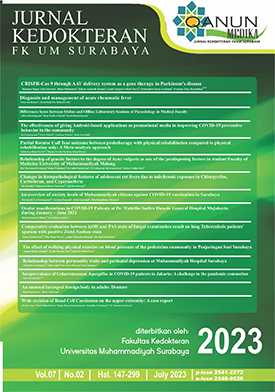Relationship between personality traits and perinatal depression at Muhammadiyah Hospital Surabaya
Abstract
Perinatal depression is a feeling disorder that occurs in a woman during pregnancy and after childbirth. Perinatal depression can be seen from various factors, one of which is personality traits. This study aims to determine the relationship of personality traits with perinatal depression at Muhammadiyah Hospital Surabaya. This study was observative analytic using a cross-sectional approach, conducted on 96 respondents using the Edinburgh Postnatal Depression Scale (EPDS) and the OCEAN personality trait questionnaire. The result of the multiple linear statistical tests on the F test is p=0.00 (p<0.05), the t-test on the extraversion personality trait is p=0.031 (p<0.05), and the neuroticism personality trait is p=0.000 (p<0.05). The coefficient of determination test R2= 37.0%. In conclusion, there is a relationship between personality traits and perinatal depression at Muhammadiyah Surabaya Hospital.
Full text article
References
Alansari, B. (2016). The Big Five Inventory (BFI): Reliability and validity of its Arabic translation in non clinical sample. European Psychiatry, 33(S1), S209-S210. doi:10.1016/j.eurpsy.2016.01.500
Asselmann, E. et al. (2020) ‘Maternal personality, social support, and changes in depressive, anxiety, and stress symptoms during pregnancy and after delivery: A prospective-longitudinal study’, PLoS ONE, 15(8 August), pp. 1–18. doi:10.1371/journal.pone.0237609.
Dewi, Y. R. (2012) ‘Efektifitas Pemberian Psikoedukasi tentang Depresi Perinatal untuk Meningkatkan Pengetahuan Bidan dalam Penanganan Depresi Perinatal di Kecamatan Balen KabupatenBojonegoro’.
Furilta, A. E. et al. (2020) ‘Praktik Perawatan Kehamilan di Desa Pohijo, Kecamatan Sampung Ponorogo: Analisis Transkultural’, Gaster, 18(1), pp. 21–36. doi: 10.30787/GASTER.V18I1.413.
Gondo, H. K. (2012) ‘Skrining Edinburgh Postnatal Depression Scale (EPDS) Pada Postpartum Blues.’
Hughes dkk (2012) ‘Memperkaya Pelajaran dari Pengalaman, edisi 7’.
Juwarni, S. (2015) ‘ASUHAN KEHAMILAN DALAM PERSPEKTIF BUDAYA JAWA DI DESA LABUHAN LABO KECAMATAN PADANGSIDIMPUAN TENGGARA KOTA PADANG SIDIMPUAN TAHUN 2015’, Nhk 技 ç ” , 151, pp. 10–17. doi: 10.1145/3132847.3132886.
Kusuma, R. (2018) ‘STUDI KUALITATIF: PENGALAMAN ADAPTASI IBUHAMIL’, Jurnal Akademika Baiturrahim Jambi, 7(2), p. 148. doi: 10.36565/JAB.V7I2.78.
Linda, ni komang (2019) ‘PREVALENSI DAN FAKTOR RISIKO DEPRESI POST PARTUM DI KOTA DENPASAR TAHUN 2019’.
Lowdermilk DPerry SCashion M (2013) No Title Keperawatan Maternitas (2-Vol Set).
Lupattelli, A. et al. (2018) ‘Self-reported perinatal depressive symptoms and postnatal symptom severity after treatment with antidepressants in pregnancy: A cross- sectional study across 12 European countries using the edinburgh postnatal depression scale’, Clinical Epidemiology, 10, pp.655–669. doi: 10.2147/CLEP.S156210.
Maria Muzik (2010) ‘Perinatal depression: implications for child mental health’.
NikÄević, A. V., Marino, C., Kolubinski, D. C., Leach, D., & Spada, M. M. (2021).Modelling the contribution of the big five personality traits, health anxiety,and COVID-19 psychological distress to generalised anxiety and depressivesymptoms during the COVID- 19. Journal of Affective Disorders 279,578- 584 doi: https://doi.org/10.1016/j.jad.2020.10.053
Oddo-Sommerfeld, S. et al. (2016)‘Longitudinal effects of dysfunctional perfectionism and avoidant personality style on postpartum mental disorders: Pathways through antepartum depression and anxiety’, Journal of Affective Disorders, 191, pp. 280–288. doi:10.1016/j.jad.2015.11.040.
Park, E. M., Meltzer-Brody, S. and Stickgold, R. (2013) ‘Poor sleep maintenance and subjective sleep quality are associated with postpartum maternal depression symptom severity’, Archives of Women’s Mental Health, 16(6), pp. 539–547. doi: 10.1007/s00737-013- 0356-9.
Pearson, R. M. et al. (2018) ‘Impact of dysfunctional maternal personality traits on risk of offspring depression, anxiety and self-harm at age 18 years: A population-based longitudinal study’, Psychological Medicine, 48(1), pp.50– 60. doi:10.1017/S0033291717001246.
Pradnyana, E., Wayan Westa, & Ratep, N. (2013). Diagnosis Dan Tata Laksana Depresi Postpartum Pada Primipara. Rumah Sakit Umum Pusat Sanglah, 1- 16.
Putri, R. A. and Eryando, T. (2020) ‘Dampak Depresi Antenatal Terhadap Hasil Kelahiran: Systematic Review’.
Robakis, T. K. et al. (2015) ‘Optimistic outlook regarding maternity protects against depressive symptoms postpartum’, Archives of Women’s Mental Health, 18(2), pp. 197–208. doi: 10.1007/s00737-014-0446-3.
Roman, M. et al. (2019) ‘Personality traits and postnatal depression: The mediated role of postnatal anxiety and moderated role of type of birth’, Frontiers in Psychology, 10(JULY), p. 1625. doi: 10.3389/FPSYG.2019.01625/BIBTEX.
Suprapto, H. (2017) ‘Metodologi Penelitian Untuk Karya Ilmiah.’
UdoviÄi, S. (2014) ‘Lima Besar Sifat Kepribadian dan Dukungan Sosial sebagai Prediktor Depresi Pascapersalinan’.
Wibowo (2013) ‘MANAGEMEN KINERJA’.
Widiadnyani, L. S. (2021 (2021) Asuhan Kebidanan Komprehensif Pada Perempuan ‘WM’ Di PMB ‘KA’ Wilayah Kerja Puskesmas Kintamani IV Kabupaten Bangli Tahun 2021. Available at: https://afdelinasusari.wordpress.com/20 15/05/20/kehamilan-disertai-penyakit- jantung/ (Accessed: 18 January 2022).
Widiger, T. A., & Costa Jr, P. T.(2013). Personality Disorders and The Five- Factor Model of Personality: Rationale for the Third Edition. Dalam Widiger,
T. A., & Costa Jr, P. T. Personality Disorders and The Five-Factor Model of Personality: Third Edition (hal. 3-11). Washington: American Psychological Association.
Zahrani, N. (2018) ‘Uji Validitas Konstruk Pada Instrumen Self-Esteem Inventory Dengan Metode Confirmatory Factor Analysis (CFA)’, Jurnal Pengukuran Psikologi dan Pendidikan Indonesia (JP3I), 5(1). doi: 10.15408/jp3i.v5i1.924
Authors
Copyright (c) 2023 Ninuk Dwi Ariningtyas, Putri Aqila, Era Catur Prasetya, Roni Subagyo

This work is licensed under a Creative Commons Attribution 4.0 International License.

Qanun Medika by FK UM Surabaya is liscence under Lisensi Creative Commons Atribusi 4.0 Internasional.

